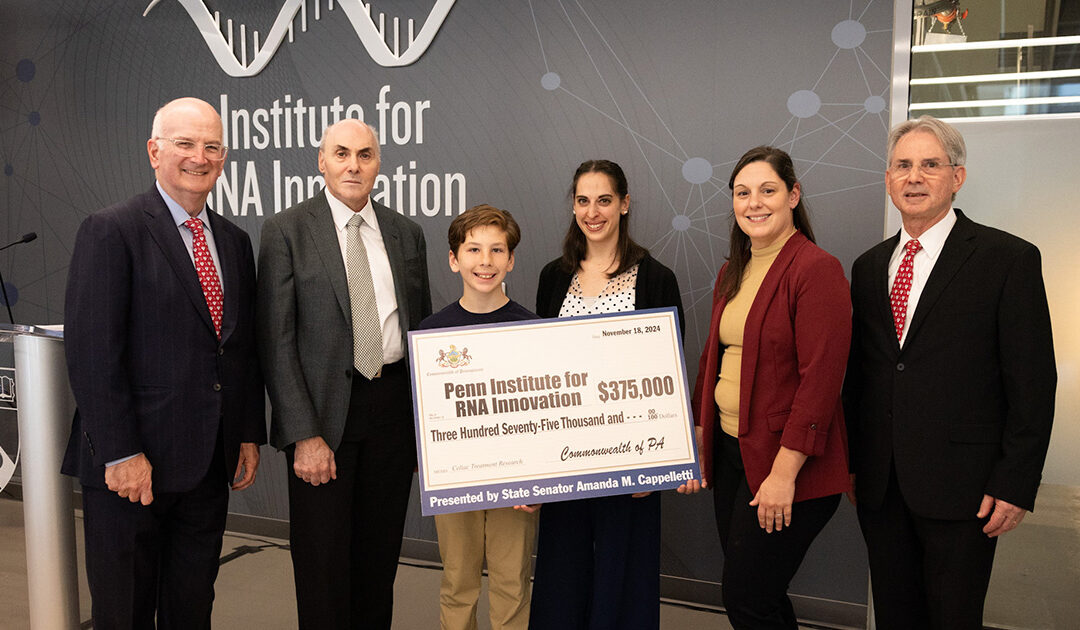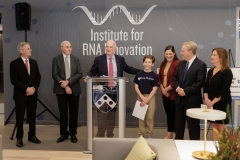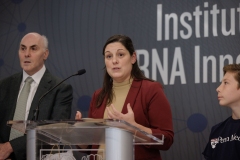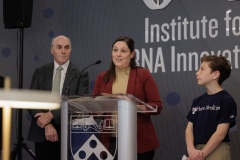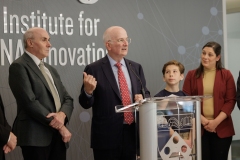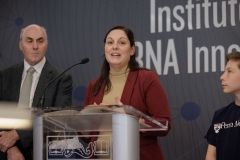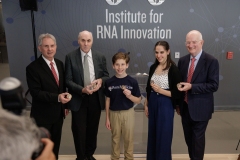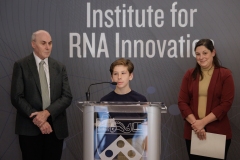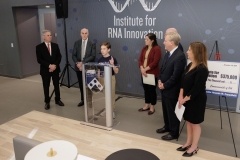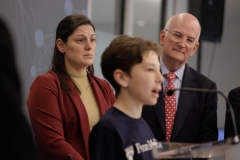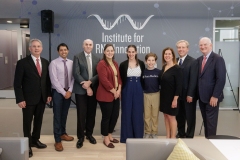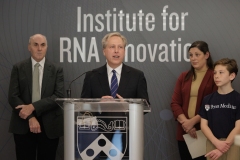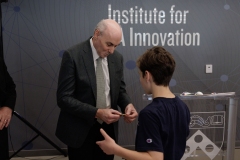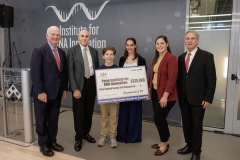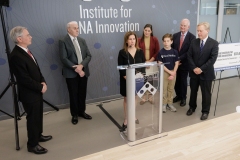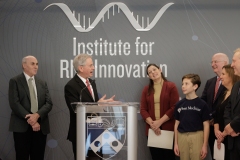From left to right: Kevin B. Mahoney, CEO of the University of Pennsylvania Health System, Drew Weissman, MD, PhD, Director, Institute for RNA Innovation, University of Pennsylvania, Jax Bari, Pennsylvanian with Celiac and co-founder of Celiac Journey, Jilian Melamed, PhD,postdoctoral fellow at the Perelman School of Medicine at the University of Pennsylvania, Senator Amanda M. Cappelletti, Senate District Seventeen, Jonathan Epstein, MD, Interim Executive Vice President of the University of Pennsylvania for the Health System and Dean of the Perelman School of Medicine,
Pictured at: Penn Institute for RNA Innovation for a state grant presentation on November 18, 2024.
Philadelphia, PA − November 18, 2024 – Senator Amanda M. Cappelletti (D-Montgomery/Delaware) today presented a state grant for $375,000 to the Penn Institute for RNA Innovation for celiac disease-related research. The funding will support research into how RNA therapeutics could be used to prevent celiac disease.
“Directing state funding to scientific research is one of the most meaningful ways we can use our resources,” said Senator Cappelletti. “I know many families across Pennsylvania struggle to live with a celiac diagnosis and research like this can lead to life changing results. I’m proud to have so many innovators working in our Commonwealth and I look forward to seeing the good work that comes out of this grant award.
The research lab is led by Drew Weissman, MD, PhD, a Nobel-Prize winning physician and researcher at the Perelman School of Medicine at the University of Pennsylvania, best known for his contributions to RNA biology and the COVID-19 mRNA vaccines.
“Our research into how celiac disease could be treated with RNA represents a new era of research,” said Weissman. “We think RNA can not only rev up immune systems to protect against infectious diseases like COVID but be tailored to fix autoimmune diseases including celiac disease and prevent allergic reactions.”
Celiac disease is an autoimmune disease that is triggered by consuming gluten and results in damage to the small intestine. Symptoms vary, but can include diarrhea, fatigue, headaches, brain fog, and more.
An estimated 1 in 133 Americans, or about 1% of the population, has celiac disease. However, recent screening studies point to a potentially higher prevalence than 1% in the United States.
In Pennsylvania, we know that many families are impacted by celiac, including a family from District Seventeen. The Bari Family includes Jax Bari, an 11-year-old boy with celiac disease and a 6th grader at the William Penn Charter School in Philadelphia. Jax is the Co-Founder of Celiac Journey, a patient-centric advocacy organization, with an emphasis on telling the pediatric perspective of 3.3 million American Celiacs. Jax has spoken at the HHS Food is Medicine Summit, NIH’s Impact of Diet on Mucosal Immunity and Immune-mediated Digestive Diseases, and he has been honored by the Pennsylvania State Senate. Jax has been featured twice on the #AmericaStrong segment of ABC’s World News Tonight with David Muir and on NBC’s TODAY Show. Jax and the Bari family’s advocacy was crucial to securing this funding.
“I am grateful for this opportunity to share my lived experience and my goal: eating without fear,” said Jax. “The only treatment for celiac is a strict gluten free diet for life, so far.” Jax said in hopes that research like this will lead to a cure.
The Penn Institute for RNA Innovation is dedicated to the understanding and development of all things RNA and helps form collaborations that will unify and link all elements from RNA-based basic science through to therapeutic activities.
This research project will power investigations into how RNA therapeutics could potentially be used to treat diseases like celiac disease where one’s immune system causes damage to the body rather than protection from diseases.
“Penn Medicine scientists have shown the many ways RNA-based technology is poised to power new and better treatments,” said Kevin B. Mahoney, chief executive officer of the University of Pennsylvania Health System. “In research, the path from idea to innovation is rarely a straight line, and this funding will help our researchers continue to pursue the answers for questions that could unlock the potential of RNA-based therapeutics for a range of disorders, including celiac disease.”
“Breakthroughs in the lab are accomplished through the dedication of scientists and from the support of those who care about medical advancements and those affected by disease, such as a remarkable young advocate, Jax Bari, and his family,” said Jonathan A. Epstein, MD, Interim Executive Vice President of the University of Pennsylvania for the Health System and Dean of the Perelman School of Medicine. “Funding from many sources, including public and private, drives new scientific innovations to benefit people worldwide.”
Beyond Celiac reports that 49% of people with celiac disease have sacrificed life experiences because of their gluten-free diet/celiac disease. Additionally, 49% of children with celiac disease exhibit anxiety, including social and separation anxiety, physical symptoms, excessive worry, and pessimism.
Senator Cappelletti has been a leading advocate for celiac in the Senate, having fought for state dollars to go to the Children’s Hospital of Philadelphia for celiac research and introduced bills to make gluten labeling a requirement for food and medicine products distributed in Pennsylvania.
Today’s check presentation was recorded and can be viewed here.
###

